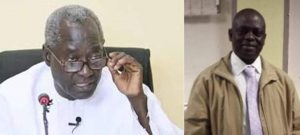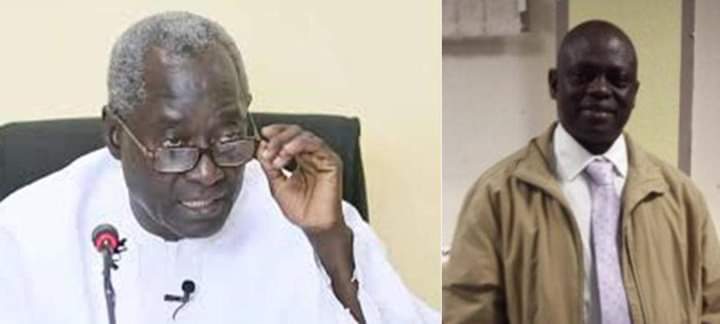Alagi Yorro Jallow
 Fatoumatta: Who is a critic or a public intellectual activist? Here are, I believe, at least three critical elements that can contribute to the role of public intellectualism, both rational and intuitive: knowledge, ability, and an act of moral courage. Furthermore, that includes the willingness to awaken society for a noble cause or purpose. In the words of Albert Einstein: “The world is a dangerous place, not because of those who do evil, but because of those who look on and do nothing.” Does the average Gambian know what makes one a public intellectual activist? I do not think so. Rather than offer definitions, could you permit me to cite examples instead?
Fatoumatta: Who is a critic or a public intellectual activist? Here are, I believe, at least three critical elements that can contribute to the role of public intellectualism, both rational and intuitive: knowledge, ability, and an act of moral courage. Furthermore, that includes the willingness to awaken society for a noble cause or purpose. In the words of Albert Einstein: “The world is a dangerous place, not because of those who do evil, but because of those who look on and do nothing.” Does the average Gambian know what makes one a public intellectual activist? I do not think so. Rather than offer definitions, could you permit me to cite examples instead?
Public intellectuals have a crucial role in broadly contributing to the humanitarian discourse and, particularly, the language and commentary relating to fearlessly telling the truth to power. We have seen in recent times, the souring of the language used by populist politicians often those demagogues with populist and tribal tendencies with regards to falsehood and tribalism, using stereotypes that debase discourse, grounded as it is it in irrational but contrived fear and ignorance provides fertile ground for political extremism and ideological extremism of individualism at best. Furthermore, this has to be opposed to the courage of a progressive public intellectual culture.
Fatoumatta: How many Gambians do know or heard about Professor Cornell West? If you do not, look him up on Google. Find his books, read them. Go on Youtube, watch his speeches. I would give you one clue about him just if you do not want to get off your couch. Professor Cornell West is a prominent and provocative democratic public intellectual and Professor of Public Philosophy at Harvard University. He holds Professor Emeritus’s title at Princeton University, one of the most prominent public intellectuals to campaign for President Barack Obama’s elections in 2008. At the time, Professor of Princeton and a man who had spoken for the American poor and African Americans’ plight and challenges facing black men based on poverty, jobs, wealth, and racism left behind by civil rights leader Dr. Martin Luther King Jnr. Professor Cornel West has been outspoken critics of President Obama, saying his economic policies have failed poor people in general and black people. Professor West also hit out at former President Barack Obama, alleging that the Black Lives Matter movement emerged during his second term in office when the US had a Black attorney general and a Black secretary of homeland security.
Nevertheless, when President Obama assumed office and began to bail the banks without punishing those responsible for its initial collapse, Professor Cornel West called President Obama a puppet of Wall Street oligarchs. Professor West told Barack Obama that he had abandoned the poor and working people to satisfy corporate plutocrats. When President Obama expanded the US drone policy, killing women and children in Pakistan and Afghanistan, he called President Obama a war criminal. It did not matter to him that this was the same man he campaigned for only to tell him the truth when Obama failed to deliver to his expectations. He was not indebted to him; he was indebted to the truth; he was loyal to every politician’s responsibility of constant introspection, even they are his friends.
Fatoumatta: Do you know about Professor Patrick Lumumba Otieno Lumumba? The Kenyan public intellectual and an eloquent lawyer who preached so much against corruption, the government decided to make him the head of the anti-corruption commission. They felt it would be a prelude to shutting him up or get him on their side. Instead, he began to set the heat on the very political elites that hired him. In the end, they had to boot him out. That is what a public intellectual is; he is only friends with politicians to the extent that they have nothing questionable about his political behaviors.
Fatoumatta: I am sure you know Professor Wole Soyinka. Nigerian playwright and political activist who received the Nobel Prize for Literature in 1986, one among contemporary Africa’s greatest writers and one of the continent’s most imaginative advocates of native culture and human social order. Even at old age, Professor Soyinka joined a civic society group of activists, the Save Nigeria Group (SNG), in 2010 to ask that (vice President at the time Good luck Jonathan ) should be made acting President while President Yar’dua recuperated in Saudi Arabia. A few years later, that same Professor Soyinka called the government insensitive, callous, and even compared President Goodluck Jonathan to King Nebuchadnezzar. Professor Wole Soyinka said the president of Nigeria was King Nebuchadnezzar, who has always been a lucky king. Nebuchadnezzar, born 634 BC, has refused to die. On every continent, in every century, someone has always been there fancying and using him as a totem of political interests. Fabled in Voltaire’s White Bull, King Nebuchadnezzar was appropriated by the fallen Iraqi leader, Saddam Hussein, who was said to have considered himself to be the reincarnation of Nebuchadnezzar according to Soyinka that President Goodluck Jonathan is re-incarnated King Nebuchadnezzar. When President Muhammadou Buhari was presented as the All Progressive Congress (APC) Presidential candidate, the same Professor Soyinka spared no words in reminding the country, that the grounds on which Muhammadou Buhari was being promoted as a choice was pitifully naïve. That is how a public intellectual reacts to issues. This is what public intellectualism is all about.
The Gambian public intellectual’s wisdom is despised, and their words are not heard. This aphorism holds when it comes to politics. Moreover, nowhere is it more apparent than in The Gambia, where elective politics, human rights, and social justice activism remain perverse of the semi-literate and not the well-heeled elite and well-connected middle class.
Fatoumatta: Two other Gambian public intellectuals reside in the Gambia whom I have deep admiration for, but I would leave it there are Lawyer Lamin J Darboe and Halifa Sallah. After some deep introspection, I discovered that I could not identify even more than two public intellectuals in the Gambia today, apart from Lamin J. Darboe, who has been consistent for decades in his analysis and interrogation of the 1997 Consitution and, finally, the 2020 Draft Constitution. A public intellectual and a towering figure in Constitutional originalism, the roots of his signature traditional approach in law. He is the most sought -after defense lawyer in the Gambia and the most respected and feared constitutional and criminal lawyer who provides pro bono legal services to the voiceless.
For instance, take Barrister Lamin J. Darboe’s role in educating the Gambian people about the Draft Constitution. Despite protestations that the Draft Constitution it proposes are ill-timed, expensive, and, ostensibly, of benefit only to the ruling elite, its proponents barrel down unmoved. Though it is touted as a people’s initiative, it is driven by the Executive, complete with the State machinery and public resources. It is evident to the political elite that the indigent’s value lies only in their numerical strength. Nothing else they are better at penetrating informal settlements, a tacit acknowledgment that it is indeed society’s marginalized whose numbers determine electoral outcomes.
Fatoumatta: For all living witnesses, his historic and heroic role during the political impasse in 2016 Halifa Sallah told the global media that outgoing president Yahya Jammeh would automatically “become a rebel the 19th of January if Yahya Jammeh fails to transfer power to President-elect Adama Barrow peacefully”. Another example of public intellectual activism in the Gambia is anything like the four examples I had mentioned above. Nothing. Nothing even remotely close to Halifa and Lamin J. Darboe.
Predictably, the upcoming Presidential elections had allowed all manner of characters to assume the role of ‘critic,’ ‘agents of change,’ public ‘intellectuals, activists, pundits, party surrogates, and social media analysts. Common sense took flight, as every discourse descended into ‘my candidate can do no wrong.’ ‘Do not judge my candidate from the past?’ Really? Forget the past? However, this person calls himself a critic? Is this poor education or corrosive stupidity?
Fatoumatta: So, the search for public intellectuals or conscious critics living in the Gambia today continues. Who among them on social media and those intellectually bankrupt is not a turncoat, party propagandist, or a cash-and-carry critic? I want an example of a Gambian intellectual living in the Gambia that does not look the other way when his favorite party or politician is doing something highly questionable. Suppose you cannot apply the same standard of scrutiny to the Alliance For Patriotic Reorientation and Reconstruction (APRC)United Democratic Party ( UDP) the way you apply to National People’s Party (NPP) People’s Democratic Organization for Independence and Socialism(PDOIS). In that case, you cannot call yourself a critic, and you are no public intellectual. You are just a jobber with huge Facebook followers, a position which I find very legitimate, only that one should not confuse the two.
How do some unsavory characters end up in prime political, institutional, and non-institutional actors in public policy processes positions? Why have brilliant minds failed to register on the political scale while those of the lowest ethical and moral probity shine? The answer to these questions may lie in the availability of vast resources. It appears that money is the powerful force that the wealthy use to tip the scales in their favor. Unfortunately, in so doing, they disrupt the ideals of the democratic process to the extent that those least endowed with leadership qualities make it to the helm.
Fatouatta: A quote attributed to lawyer PLO Lumumba puts things in perspective, saying, “I held 250 town hall meetings. I articulated solutions to our problems in my constituency. My opponent did not campaign at all. He gathered money and showed up one day to the elections. He distributed money. He won.”
Ideas do not move Africans. Their stomach leads them because African intellectuals fail to proffer thought leadership in various critical political discourse areas and sustenance. Most African public intellectuals cannot measure up to their intellectual conformity, intellectual timidity, and failure to fully address economic and political issues and prospects and the attitude and orientation of an African intellectual identity. However, the public intellectual’s voice continues to be unheard beyond elective politics. Their wisdom cannot be heard above the din of those who influence public policy.
Perhaps this new dispensation of an enlightened mass will reject political parties’ notion as merely time-bound vehicles of convenience for the ruling elite. They will refuse to subscribe to movements with no ideology, whose sole purpose is to mobilize the poor into voting blocs.
Fatoumatta: A social media commentator recently remarked wryly that slum dwellers are always political campaign targets. The ubiquitous roadshow trucks complete with elderly politicians gyrating to loud music are absent in gated communities and the leafy suburbs. The affluent do not easily fall for the hackneyed tricks of the so-called public intellectual politicians.

